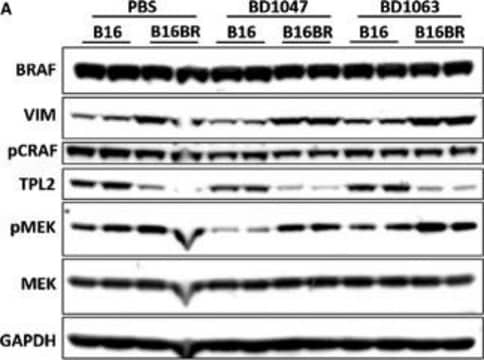SAB4200852
Anti-p53 antibody, Mouse monoclonal
clone BP53-12, purified from hybridoma cell culture
About This Item
Produits recommandés
Forme d'anticorps
purified from hybridoma cell culture
Niveau de qualité
Type de produit anticorps
primary antibodies
Clone
BP53-12, monoclonal
Espèces réactives
human
Concentration
~1 mg/mL
Technique(s)
immunoblotting: 0.06-0.125 μg/mL using human epidermoid carcinoma A431 cell line whole extract
immunofluorescence: 0.25-0.5 μg/mL using human A431cells
Isotype
IgG2a
Numéro d'accès UniProt
Conditions d'expédition
dry ice
Température de stockage
−20°C
Modification post-traductionnelle de la cible
unmodified
Informations sur le gène
human ... TP53(7157)
Description générale
Spécificité
Application
Actions biochimiques/physiologiques
Forme physique
Stockage et stabilité
Clause de non-responsabilité
Not finding the right product?
Try our Outil de sélection de produits.
Code de la classe de stockage
12 - Non Combustible Liquids
Classe de danger pour l'eau (WGK)
WGK 1
Point d'éclair (°F)
Not applicable
Point d'éclair (°C)
Not applicable
Certificats d'analyse (COA)
Recherchez un Certificats d'analyse (COA) en saisissant le numéro de lot du produit. Les numéros de lot figurent sur l'étiquette du produit après les mots "Lot" ou "Batch".
Déjà en possession de ce produit ?
Retrouvez la documentation relative aux produits que vous avez récemment achetés dans la Bibliothèque de documents.
Notre équipe de scientifiques dispose d'une expérience dans tous les secteurs de la recherche, notamment en sciences de la vie, science des matériaux, synthèse chimique, chromatographie, analyse et dans de nombreux autres domaines..
Contacter notre Service technique








